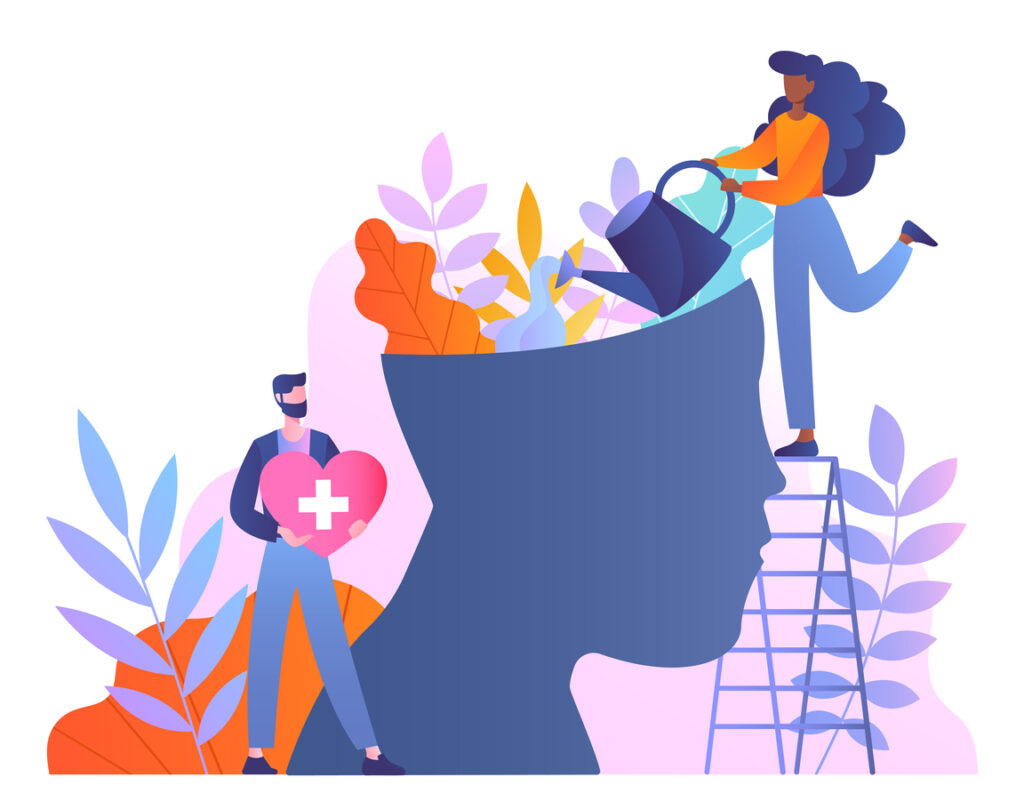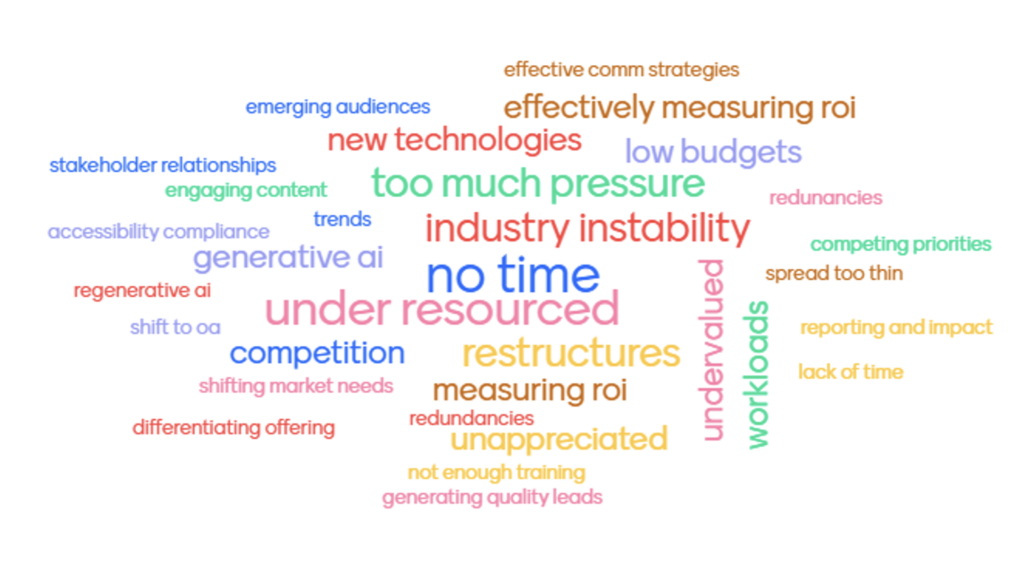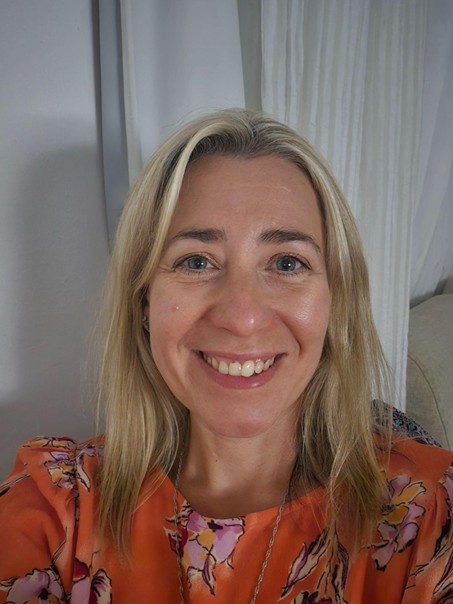Editor’s Note: Today’s post is by Lou Peck and Sowmya Mahadevan. Lou is CEO and Founder of The International Bunch. Sowmya is COO and Cofounder of Kriyadocs.
Mental health affects everyone across an organization. Today we explore insights on mental health—the good, the bad, and the ugly—with the founders and leaders of two industry organizations. What are the challenges of starting your own business and keeping it running? What lessons have been learned, both toward your own mental health, but also the health of those working for you?

When you founded your business, what impact did this have on your own mental health?
Sowmya: I was 25 when I became an entrepreneur, excited and driven by the journey ahead but completely unsure of what to expect. Looking back, I was first propelled forward into this decision by a rush of adrenaline and a desire to explore new avenues. If I were to capture the essence of my thoughts then, it would have been: “I’m diving in headfirst, unsure but determined to navigate through.”
But as I began navigating the complexities of entrepreneurship, I started to understand the toll it could take on my mental health. Especially as a woman, in the early years of my career, I developed a false notion that I must check my emotions at the door and stay strictly professional at work. It took me several years to realize that this approach was, in fact, counterproductive and actually damaging to my own mental health. As an entrepreneur, the challenges can be non-stop and I eventually began to appreciate the importance of being mindful and prioritizing my own mental wellbeing.
Lou: Did you know that 72% of entrepreneurs say that they wrestle with mental health issues? I bet if people felt able to be more honest, that percentage would be even higher.
I’d just been made redundant towards the end of 2016 (my second time being made redundant), and so my head wasn’t in the best place. Redundancy is not personal. You are a number, and businesses need to do what they need to do to survive, otherwise everyone loses. But it’s still hard not to take it personally and feel rejected.
I’m a pretty optimistic and positive person and just thought ‘redundancy number two’, I need to take back control of my career. After 18 years of working in-house, if I’m going to give away hours of my life to a company, I might as well give myself that shot and try it on my own. Of course, imposter syndrome crept in and made me feel like I couldn’t take this bold new step into the unknown. How was I going to pay my bills? What were people saying about me? Did people think I was a failure because I had been made redundant? What was wrong with me? Was I going to fail? I spent several sleepless nights worrying about what was next, but proactively reached out to my network and picked up a maternity cover position with Wiley. This gave me the confidence to start building up my business whilst I had a temporary income.
True to myself, I threw myself into working with the team at Wiley, building my business on the evenings and weekends, whilst being pregnant and building a life with my partner. Life was busy and hard. I felt I couldn’t not be working so I started working again pretty soon after having Poppy. I remember being in the hospital after giving birth, worried that I had abandoned Wiley, so I did a handover email in the hospital bed! I felt I couldn’t let my clients down. What I didn’t get is that they understood, were not expecting to hear from me, and it was okay, but I felt I needed to get back to work as soon as possible, so I was back working for clients within weeks. Not something I would recommend and totally on me, not them.
Running a business has been amazing, overwhelming, and sometimes downright frightening, as you’re suddenly responsible for other people. I don’t think I ever really understood the importance of mental health until I started consulting and then founded The International Bunch.
Looking back over the years since you set up your business, what have been the biggest mental health challenges?
Sowmya: One of the earliest and greatest realizations for me as an entrepreneur was the value of time — it is a precious commodity that is always in short supply.
Despite pouring long hours and hard work into the business, my to-do list only grew longer. Especially in the early years, when resources are scarce, founders are compelled to wear multiple hats, juggling a variety of roles simultaneously.
Balancing the demands of work and personal life added another layer of complexity. Your children need you, your family members need you, your friends need you. There are social engagements to attend. This constant juggling act can leave you feeling overwhelmed and dissatisfied with the perceived inability to do everything, be everywhere, and fulfill every obligation.
Personally, I have often pressured myself into thinking that I must do it all — be the perfect manager, the perfect mother, the perfect salesperson, the perfect this and the perfect that. In trying to do everything, I also found myself putting my own mental and physical health at the bottom of my to-do list, where things that I never had the time to get to languished and never saw the light of day.
While I recognize that learning to prioritize is a key entrepreneurial skill, the very act of deciding what to take on and what to leave behind can be an extremely arduous and mentally taxing process.
Lou: Recognizing that I have value and being confident.
Yes, yes, I know some people find it hard to believe that I struggle with confidence. That moment when you walk into a conference, looking for someone you know or someone who looks on their own — that is me on the inside, frantically searching the room. But on the outside, I am smiley, confident and happy-go-lucky — you’d just never know.
Being valued comes from within, not from your surroundings. As Sowmya says, you try to be perfect: the perfect colleague, boss, mentor, partner, Mum, daughter, sister, friend, host, speaker, facilitator, vendor, team member, etc. It’s exhausting and not real. Being valued means knowing that I have this and that if I just give myself the space to focus and plan, I’ll be OK and will just do my best.
It was only during the pandemic that I realized how much my dyslexia affects my thought processes and that, with some simple adjustments, I could really help myself. I’d ignored it since I was young, thought there was something truly wrong with me and didn’t realize it was more ‘normal’ than not. In fact, having ADHD and dyslexia has its challenges. I have just learned how best to manage to get the most out of what I do. But I still feel awkward saying it — as if something is wrong with me.
We work with incredibly smart academically bright people. I used to feel that was a really challenging area for me to feel I could offer much to the conversation, especially when I worked at the Royal Society of Chemistry as many peers around me had PhDs. Academically speaking, I’m a late bloomer. During my teens, I grew up on a small island in the Mediterranean called Malta. School was not a priority for me, in fact, I was rarely there. When it came time for university, I had no A Levels (17-18 years qualifications) and some IGSCEs (15-16 years qualifications) with low grades. So off I went to Writtle Agricultural College (I come from a legacy of farming and grew up in hospitality so agricultural college offered me an important stepping stone). I had to write assignments to prove my capabilities and get on to a higher national diploma (HND) course and then top up with a BSc. When I started working after university, I recognized the importance of furthering my learning and, since then, have become qualified in a number of specialist areas. There was no real support for me along the way as to why I found academic studies hard until I was in control of my own learning. Now with so much experience and knowledge under my belt, I don’t feel as intimidated, and I know my worth and value better. It’s about building relationships with people and gaining mutual respect. We’re all just people at the end of the day, usually with the same common goal to help our organization succeed.
Lastly, in terms of mental health challenges, is feeling lonely. Who else can I talk to who has set up a business and knows what to do next? The operations side has been an eye-opener for me, as has all the time-intensive administration and compliance. When you start out, you play every role imaginable but, as the business grows, you realize the importance of having brilliant people by your side to help support the team and business. It still can be lonely heading up a business, so networking and being mentored with your peers is essential.
How is your mental health right now?
Sowmya: Although the demands on my plate have only multiplied since I first started out and I still find myself gripped by the sense of having to do too much in too little time, I have gradually come to realize that I am not meant to be a one-person superhero squad that has to do it all.
Today, my focus is on continuous progress. Each day is a new opportunity to learn, and I have been growing to find fulfillment in the journey of improvement rather than perfection. Embracing the fact that I may not know many things has been quite empowering. By letting go of my self-imposed expectation to have all the answers, I have found it easier to ask questions, be open to learning from experts, and delegate tasks more readily.
I have come to appreciate vulnerability as a crucial trait in leadership. Today, I feel confident that I am on a better path than I was years ago. By choosing to invest in my continuous growth, embracing vulnerability in my journey as a founder, and reaching out for support when necessary, I have found an approach to work and leadership that feels more fulfilling and sustainable.
Lou: Honestly…I’ve been better. It’s hard to knock me down, and these last few months, I feel like I have been battered left, right, and center, but as Elton John says, ‘I’m still standing.’ Our International Bunch colleague Nuree dying unexpectedly has been devastating for me and the team. We’re only a core team of seven, well, six now.
Managing a team comes with its own challenges — wanting to do the best for our clients, owning a company on top of that, and realizing all the things you should be doing that you’re not doing yet because you are only a small team, is hard!
I’m a fighter, and resilient, but I need to be honest with myself and take those moments out of the day to get fresh air and enjoy the rare sunshine we’ve been having here in Wales. I need to start being kinder to myself and take better care of myself. I feel like a failure as a mum because I work so much, and being a ‘geriatric’ mother (in the UK, when you have a baby at over 35, you are called geriatric), I should do better (my kids are only two and six). I envy other mums spending lots of time with their kids — it’s time I’ll never get back.
Being vulnerable is OK. We have incredible people in our industry — several I call good friends — and in fact, work is my social life. I’m a bit of a recluse now at home, spending quality time with my family, pottering around with my pets including four donkeys, and living the Welsh dream. So going to a conference means I get to go ‘Out Out’ (if you’re unfamiliar with this term, comedian Micky Flanagan can tell you all about it) and be with friends, meet new people, and discover all the industry gossip. That keeps me sane.
What advice would you give someone who is just starting out about supporting their mental health?
Sowmya: I would encourage them to seek out and prioritize building meaningful relationships with supportive people. Whether it’s through networking or spending quality time with family and friends, forming these connections is crucial. It’s all too easy to become consumed by your work and overlook the importance of strong interpersonal bonds.
Running a business inevitably involves having to navigate a lot of highs and lows. I believe that success is defined by how well we manage the lows while staying grounded through the highs. A circle of supportive people around you — however small it may be — can enhance the joy of the highs while also cushioning you from the lows.
I strongly believe that effective communication is also very important in maintaining strong relationships and managing stress. Honesty opens you up to solidifying and strengthening connections. So, along with cultivating relationships with supportive people, I would also encourage new entrepreneurs to focus on effective communication as a foundational aspect of supporting mental wellbeing and maneuvering the many complexities of entrepreneurship.
Lou: For me, it’s all about being kind to yourself and recognizing when you need to get support. It’s not a weakness to show that you need help or support, it’s a strength. It helps you develop and grow, build a supportive network around you. Check out some of our own industry people giving their advice as part of International Women’s Day 2024, discover some great tips.
One of the biggest things I learned during the pandemic was that it’s not about the amount of time you spend with your loved ones, it’s what you do with that time. Imagine sitting with your loved ones at the table and having lunch with no devices or distractions, just quality time and conversation together. That hour spent together is worth more than spending the day together all on different devices, not talking to each other or really engaging with each other. Just take that time to stop and spend 30 minutes or an hour with someone and be present. It’s about quality, not quantity (that just reminds me of submissions…).
Do you feel there is a healthy dialogue about mental health in our industry?
Sowmya: I think that, across different industries, we are still navigating how to have truly open conversations about mental health. And in research, a field where introspection often comes with the territory, there is a sense that people might be a bit more reserved when it comes to such matters. But I see this as an opportunity for growth. We could — and we should — work together on creating a culture where it’s not just okay to talk about mental health, it’s encouraged. Maybe the key is to start small, with initiatives like mental health awareness campaigns and support networks. It is so encouraging to see that our industry has already established impressive resources and platforms for open discourse.
Lou: You know, we’re making huge strides in this area. Organizations are recognizing and trying out ways to support their team members. I feel like there is lots of goodwill and potential, but we’re not quite there yet. There is still huge pressure to achieve and get the work done without recognition or feeling valued. Our industry is in huge flux, and sometimes it can be a little soul-destroying — here one day, gone the next.
In April, I asked the ALPSP Marketing Connected Special Interest Group, ‘What worries you in your marketing role right now?’ Explore their answers in the word cloud.

This is also how the marketers felt when I worked in-house back in 2010. Why has it not changed in 2024, and why do people still feel like this?
We need to continue doing what we are doing as an industry as we already have some great initiatives and groups to join. Maybe not focus all our energy on our external target audience like researchers, editors, reviewers, and members. What if we diverted some of that focus and actually started paying better attention to our staff? We just need to be mindful that different people and cultures view things differently — and that’s OK because we, as people, are in control of how we process information and let it affect us, or not.
Would you personally feel comfortable taking a mental health day if you needed it?
Sowmya: While taking a mental health day is a valid and valuable strategy for many, it does not necessarily align with how I approach managing my stress. I find that spending an evening unwinding with my children helps me recharge and does wonders for my state of mind. I also enjoy prioritizing my physical health by incorporating morning jogs into my routine, which sets a positive tone for the day ahead.
Lou: Would I feel comfortable? Yes, as I need to lead by example with my team. But I wouldn’t call it a ‘Mental Health Day’ because that makes it a specific label. I’d just take a sick day — whether it’s my head, a body part, or feeling unwell, it’s all to do with my body. I don’t want to feel like I need to explain, I’m just out of the office on sick for the day. However, doing that is highly unlikely for me because I use work as a distraction.
We have a counselor on hand at International Bunch, so what works better for me is to book a session with her and talk through my issues and concerns. I find it really helpful, and I can then refocus and move forward. She also asks me thought-provoking questions like, ‘How is that working for you?’ which is usually followed by me saying, ‘It’s not!’.
If there was one lesson you could tell people about what you have learned about mental health at work, what would that be?
Sowmya: A leader’s primary role is to empower others to grow. As Carol Dweck eloquently states in her book, Mindset: The new psychology of success, “The view you adopt for yourself profoundly affects the way you lead your life.” I strongly believe that a good leader’s job is to mentor and inspire their team to adopt the best, growth-led view of themselves.
But before you can be a good leader, it is important to take care of yourself. Just as airplane safety procedures instruct passengers to secure their own oxygen masks before assisting others, I think entrepreneurs ought to put their own wellbeing first in order to be able to effectively guide their teams. Investing in self-care cultivates personal resilience and enables leaders to lead by example, inspiring their teams to place value on their mental health and well-being.
Lou: Not everyone is the same.
Stop, be present with a person, and recognize that maybe they need someone just to give them a moment. Being present doesn’t just apply to the team; it applies to you, too. Get away from your desk, if even for a moment, and just breathe. Or put on some of your favorite tunes and crank the volume up!
As your business has grown, what steps have you taken to improve mental health awareness at work for you and your colleagues?
Sowmya: As we have grown as a company, we have remained committed to building a supportive work environment at Kriyadocs. I believe that awareness begins with open communication, and I am invested in maintaining a culture where our team members feel genuinely supported and valued.
One of the ways we are working towards this is by fostering an environment of open dialogue, where our teams feel comfortable sharing their challenges and seeking help when they need it. Central to this effort is one of our core cultural values, “Dream big, rise together,” which underscores the importance of mutual support, trust-building, and creating a safe space at work. I have witnessed firsthand the profound impact it can have on an individual’s mental health when they feel safe enough to say, “I don’t know,” and reach out for help. I believe this creates a stronger, more resilient team.
Flexibility has also been key. Being mindful of the demands of balancing work and personal life, we strive to accommodate flexible work arrangements to support the needs of our teams. We also place a strong emphasis on rewards and recognition to continuously acknowledge team members for their contributions and keep them motivated. We believe that celebrating achievements, big or small, is essential for maintaining morale and maintaining a positive work environment.
Lou: So we’re a remote-first business, which comes with its own challenges — isolation is definitely one. I’ve worked remotely since 2003 so I’m used to it, but others aren’t, and some people really don’t like it. This became very apparent in the pandemic, for example, when speaking with a client wrapped up in their duvet in winter in the garage as that was the only place they could work quietly as everyone was home. I imagine they couldn’t wait to get back to the office!
We’ve tried and tested a few initiatives over the years:
- In-house virtual counselor on hand to offer helpful advice and support confidentially — she bills us at the end of each month for the number of sessions, and there is no limit for each person
- We offer private health insurance and free access to apps like HeadSpace
- Every day we have a 15-minute check to see if everyone is okay, if anyone has any blockers and just basically connect and engage with each other
- We’ve done training together, but we get busy, and engagement drops off. The first British Sign Language session was fun, but then we never did the second session
- We experimented with a drop-in ‘Brew and a Biscuit’ session to talk about non-work related stuff, but client work always takes priority so engagement dropped off for that too
- We have a Social Slack channel, which works well for non-work related chatter
All I can say is listen to your team, give people space, check in with them, and give them the opportunity to develop and grow in a safe and open environment.
As a business, we’ve started to support brainstorming sessions — more on a one-to-one level — to give individuals time to get everything out of their heads, make sense of it in a focused session, and then feel like they can move forward with a new plan. Just having someone listen to you, be a sounding board, and help you focus can be a game-changer.
Just start somewhere, little changes can make a dramatic difference.
How can employers and colleagues support each other’s mental health better?
Sowmya: Recently, I read Radical Candor by Kim Scott, which emphasizes the importance of both personal care and building strong workplace relationships. At work, when individuals feel supported on a personal level as well as encouraged to push their boundaries and grow, it creates a strong foundation for a high-performance, empathetic work culture.
At Kriyadocs, we have found Radical Candor to be an excellent resource in furthering our approach to supporting each other’s mental health and overall growth, both personally and professionally. Employers and colleagues can better support each other’s mental health by communicating openly and challenging each other constructively, ultimately helping each other unlock their true potential.
Lou: The main thing for me is kindness and understanding. Not everyone is the same. If someone is frustrating you, talk about it to someone or just take yourself out of the situation —put “do not disturb” on, and scream and shout if you want to. Just have a vent, get it out and move on.
There’s nothing worse than not being heard. If someone is talking to you and opening up, don’t be tempted to read that email at the same time, or reply to someone else. Just be present with them — even if it’s just for five minutes — and give them time to breathe.

Discussion
6 Thoughts on "Guest Post – Mental Health Awareness Mondays: It’s OK to Talk ‘Mental Health’, Isn’t it? Two Founders, Two Opinions"
I loved your post. Beautifully written. Thank you for sharing such a powerful message. Keep spreading positivity and light!
Thank you, Anahita, for your kind words!
Thanks Anahita!
Incredible, Lou! Your message resonates deeply and carries such powerful significance. You consistently inspire and motivate with your words. Thank you both for sharing your thoughts and experiences. Your dedication and passion are truly commendable, please continue to inspire and uplift others with your remarkable insights and efforts!
thank you Sowmya and Lou for sharing your personal and insightful thoughts, and opening the curtain into your lives, it’s not easy being a founder and leader! I hope and trust your experiences will inspire others to share, talk and be open about the challenges that are faced in our modern day work place! You are true inspirational leaders 😉
Thanks Adrian. No, it is not easy being a founder and a leader, but it certainly is a lot of fun and it is totally rewarding.


